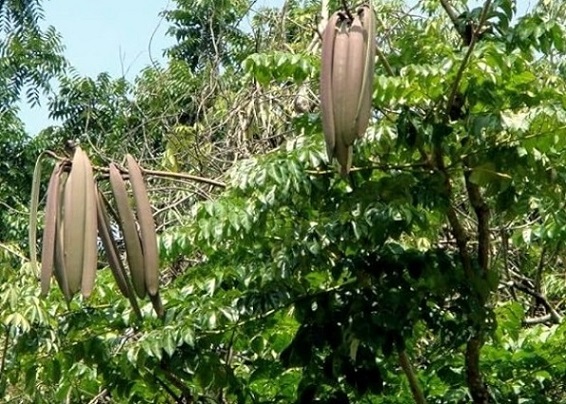Thailand Doctors Discover Neuroprotective Power of Indian Trumpet Tree Against Alzheimer’s Cell Damage
Nikhil Prasad Fact checked by:Thailand Medical News Team Jun 30, 2025 7 months, 2 weeks, 4 hours, 26 minutes ago
Thailand Doctors: A Natural Thai Remedy Shows Promise in Fighting Alzheimer’s Disease in Lab Tests
Thai researchers from Mahasarakham University and Suranaree University of Technology have found new hope for Alzheimer’s treatment in a local medicinal plant. The team discovered that a seed extract from the Indian trumpet tree (Oroxylum indicum), long used in traditional Thai medicine, shows powerful protective effects on brain cells damaged by Alzheimer’s-related toxins. This Medical News report highlights the early laboratory findings which suggest that this traditional herbal remedy could one day aid in preventing or treating neurodegenerative diseases.
 Thailand Doctors Discover Neuroprotective Power of Indian Trumpet Tree Against Alzheimer’s Cell Damage
Thailand Doctors Discover Neuroprotective Power of Indian Trumpet Tree Against Alzheimer’s Cell Damage
The study, conducted using human neuroblastoma SH-SY5Y cells in the lab, focused on how the seed extract combats the harmful effects of amyloid beta (Aβ) proteins. These proteins are known to build up in the brains of people with Alzheimer’s disease, causing oxidative stress, inflammation, and cell death. By introducing Aβ(25–35)—a toxic fragment of the protein—into the brain cells, the researchers simulated the kind of damage seen in Alzheimer’s. When the Indian trumpet tree seed extract was added, however, the damage was significantly reduced.
How the Seed Extract Protects Brain Cells
Thailand Doctors involved in the study tested two safe concentrations of the extract—25 and 50 µg/mL—and observed a remarkable improvement in cell survival compared to those exposed only to the Aβ toxin. The extract reduced reactive oxygen species (ROS), which are harmful byproducts of oxidative stress, and decreased levels of malondialdehyde (MDA), a marker of cell damage.
At the same time, the extract increased the activity of important antioxidant enzymes including:
-Catalase (CAT): helps convert hydrogen peroxide into water
-Superoxide dismutase (SOD): breaks down toxic oxygen molecules
-Glutathione peroxidase (GSH-Px): detoxifies harmful compounds inside cells
The study also found that the extract lowered the activity of caspase-3, an enzyme involved in triggering cell death. Additionally, the extract helped increase the expression of Bcl-2, a protein that protects cells from dying, and restored the phosphorylation (activation) of key survival signaling proteins: Akt, ERK1/2, and CREB. These are all known to be critical for healthy brain function, memory, and resistance to stress and inflammation.
What’s Inside the Extract That Makes It Work
Using a technique called high-performance liquid chromatography (HPLC), the researchers analyzed the chemical makeup of the extract and identified several powerful fla
vonoid compounds:
-Baicalin – 11.33 µg/g
-Baicalein – 8.19 µg/g
-Chrysin – 3.52 µg/g
These plant compounds have well-documented antioxidant, anti-inflammatory, and neuroprotective properties. Previous studies have shown that baicalein and baicalin can reduce oxidative stress, stop harmful protein aggregation in the brain, and even help generate new neurons.
Why This Matters for the Future of Alzheimer’s Treatments
Current Alzheimer’s treatments only manage symptoms and do not stop or slow disease progression. This study supports the idea that traditional herbal medicine—specifically the Indian trumpet tree—could be used to develop safer and more effective therapies. While these results are limited to lab conditions, the promising data opens doors for further animal studies and, eventually, human trials.
These findings are important not just for the scientific community but for millions affected by Alzheimer’s worldwide. With more research, this natural Thai remedy might become part of a new strategy in fighting brain degeneration.
The study findings were published in the peer reviewed International Journal of Molecular Sciences.
https://www.mdpi.com/1422-0067/26/13/6288
For the latest on
Thailand Doctors, keep on logging to Thailand Medical News.
Read Also:
https://www.thailandmedical.news/news/thailand-medical-study-involving-ginger-phytochemicals-could-transform-neurodegenerative-disease-treatments
https://www.thailandmedical.news/news/new-thailand-medical-study-reveals-link-between-oral-microbiota-and-alzheimer-s-disease
https://www.thailandmedical.news/news/herbs-and-phytochemicals-creeping-spinach-a-natural-ally-against-alzheimer-s
https://www.thailandmedical.news/articles/alzheimer,-dementia-
